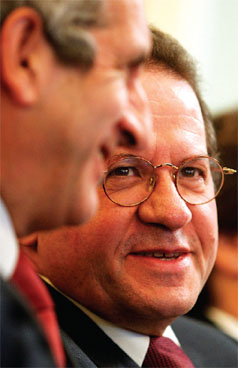 |
|
ANTONIO CASTELA |
While stories covering the disappearance
of Madeleine McCann seldom appeared on the front pages of The
Portugal News in 2008, stories revolving around the missing
British toddler appeared 41 times the past year, with the
beginning of March being one of those occasions. Portuguese
financial institutions, in the wake of the sub-prime crisis that
was initiated in the United States in August 2007, finally
admitted they were in serious trouble while Lisbon was found to
among the safest cities in Europe.
In the first week of March, The
Portugal News travelled to the Algarve-Andalusia border to
uncover details of claims by a taxi driver that Madeleine McCann
had been in his taxi days after her disappearance.
Antonio Jose
Castela Cardoso, or Castela as he is known in Vila Real de Santo
Antonio, said he told police of his dramatic story within days
of Madeleine being reported missing. Bizarrely, he suggests two
of the four adults travelling with the girl resembled some of
the then formal suspects in the case.
Speaking to
The Portugal News, Antonio Castela, 67, says he is convinced the
girl in his car on the evening of May 3rd was Madeleine McCann,
who will have been missing for ten months this coming Monday.
“She had a
defect to her eye, which made me remember my son, who has a
similar defect”, explains Antonio Castela. He added: “As she was
sitting on a man’s lap in the backseat, I could see her clearly
in my rear-view mirror she also appeared to be twitching her
chin a lot”.
The following
week, and after a spate of tragic shootings, the government was
forced into taking swift action. It announced that around two
thousand police officers were to be trained to counter the
growing sense of insecurity among citizens while simultaneously
looking to reduce violent crime.
The
announcement was made in a week where at least seven people were
murdered, most of them in the Greater Lisbon Area.
Minister Rui
Pereira, under fire since last year from the opposition for
refusing to boost security forces, told Parliament back in March
that the increase in the police contingent to 48,000 members,
forms part of the government’s so-called Security Strategy for
2008, which includes a total of 15 measures.
In mid-March,
readers were told that a number of leading financial
institutions, supported by the governor of the Bank of Portugal,
predicted that the sub-prime crisis and the lack of liquidity on
the money markets would translate into home owners paying more
on their mortgage repayments while bank charges for services
rendered are also expected to rise.
“The cost of
lending is going to increase”, predicted Governor of the Bank of
Portugal Vítor Constâncio.
The event,
staged to discuss national banking systems and world markets,
attracted all the nation’s leading figures in the financial
world with these high-profile guests predicting tough times for
home owners.
“Until now,
banks did not reflect the cost of lending correctly, and unless
markets stabilise, there will have to be changes in the costs
banks levy customers”, added the governor.
Vítor
Constâncio’s comments followed views expressed earlier by the
chairmen of a number of private banks who said that spreads or
profits charged on the base interest rates are set to increase.
BPI chairman
Fernando Ulrich expressed the fear that the effects of the
current crisis had been under-estimated.
“I fear that
we are all, including the regulators, under-estimating the
negative consequences this situation will eventually have on the
financial system”, he said.
Ricardo
Salgado of BES said the first quarter of the year had been “more
difficult” for banks, saying they have been forced to assume a
more restrictive attitude in the issuing of new loans and
mortgages.
Finance
Minister Teixeira dos Santos, eased on his usual optimistic
stance, by saying: “The final consequences of the sub-prime
crisis are unclear, while its magnitude and impact remain
unknown.”
March also
witnessed the revelation Portuguese capital is the least likely
city, in continental Europe, for a murder to occur. When
including the leading cities of the 27 European Union member
states, the only capital with a better rate is La Valetta,
Malta, which saw none of its 7,000 inhabitants murdered during
the period in question (2006).
In a move
aimed at boosting the economy, the government announced in March
it would reduce VAT by one point to 20 percent.
The rate
change came into effect on July 1st, though few consumers will
claim to have seen their shopping baskets become cheaper as a
result.
Edition:
992 |



